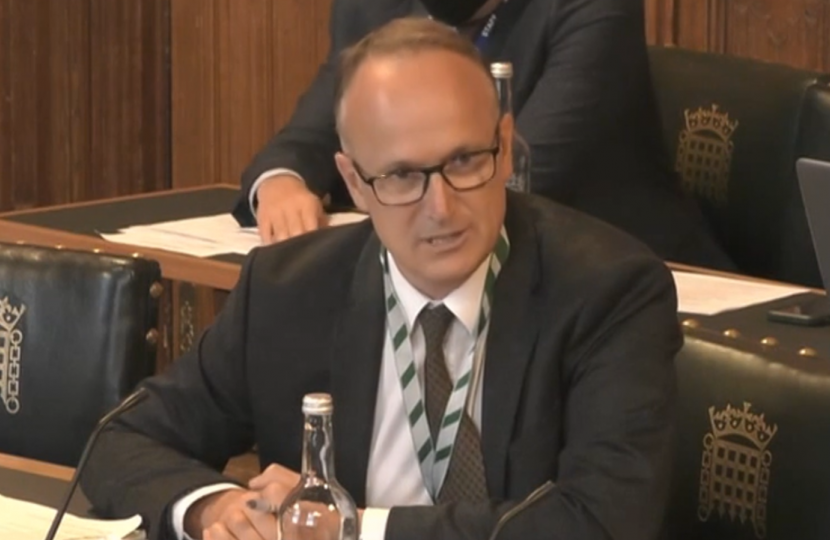
Dr Neil Hudson MP joined Environment, Food and Rural Affairs colleagues for an emergency hearing to explore the systemic challenges facing the water industry.
Thames Water’s senior leadership team, water regulator Ofwat and the Government Minister all came before the committee to deal holistically with widespread financial instability for companies, water quality issues and legal oversight on the industry.
A fortnight prior to the emergency EFRA Committee session, Thames Water’s CEO, Sarah Bentley, resigned after only two years in the post. National outrage over the high levels of sewage being discharged and the company’s substantial debt meant Bentley was asked to forgo her bonus.
Dr Hudson’s line of questioning focused on the relationship between Ofwat and private water companies where regulators can often leave to take up – usually higher paid – positions with water companies. 27 former Ofwat directors, managers and consultants are currently working in the water industry they were previously responsible for regulators. Dr Hudson is concerned about the potential human resources drain from financially constrained public sector organisation.
He also reiterated his questioning as to whether Ofwat has the teeth to properly hold water companies to account.
With huge infrastructure investment needed, Dr Hudson was keen to reinforce to the Minister that consumers must be protected - particularly at a time of inflationary pressures.
Dr Neil Hudson MP, Member of the EFRA Committee, said:
“The state of the water industry nationally is currently deeply worrying. I’ve joined constituents in their outrage at sewage discharges, financial mismanagement, and consumer price increases.
“Today’s emergency EFRA Committee hearing and the accompanying Government announcement on unlimited fines for wtare companies if they do the wrong thing, represent the latest step in our campaign to turn the tide on water companies. I’m proud to be at the forefront of core changes coming to the industry and will continue my campaign for clean water, ethical sewage management and a plentiful water supply across the nation.
“I’m tremendously pleased Government has listened to our Conservative Environment Network caucus and will be cracking down on water companies with unlimited fines and a plan to reinvest that money into a water restoration fund.”
The session was split into three parts and you can view the full proceedings, here: www.parliamentlive.tv/Event/Index/be06865a-f525-4ed8-b194-78c68b037c18#player-tabs
The first, quizzing Thames Water senior leadership team:
- Sir Adrian Montague CBE, Chair
- Alastair Cochran, Joint interim CEO
- Cathryn Ross, Joint interim CEO
The second, working with water regulator Ofwat’s senior leadership team:
- Ian Coucher, Chair
- David Black, CEO
The Third with the relevant, Department for Environment, Food and Rural Affairs, officials:
- Rebecca Pow, the Minister for Environmental Quality and Resilience
- David Hill, Director General for the Environment at DEFRA
The hearing coincided with newly announced legislation under which those who pollute the environment will face unlimited penalties that will be reinvested into a water restoration fund. This was heavily influenced by action by Dr Hudson and the Conservative Environment Network’s growing parliamentary caucus.
The current limit of £250,000 on variable monetary penalties that the Environment Agency and Natural England can impose directly on operators will be lifted, following a government consultation which received widespread public support.
This will offer regulators a quicker method of enforcement than lengthy and costly criminal prosecutions – although the most serious cases will continue to be taken through criminal proceedings.
New powers will also enable these higher penalties to be levied as a civil sanction for offences under the Environmental Permitting (England and Wales) Regulations 2016, the regime under which the majority of Environment Agency investigations take place. This will ensure regulators have the right tools to drive compliance across a range of sectors, strengthening enforcement and holding all who hold environmental permits – from energy and water companies to waste operators and incinerators – to greater account.
Environment Secretary Thérèse Coffey added:
“Polluters must always pay. We are scrapping the cap on civil penalties and significantly broadening their scope to target a much wider range of offences – from breaches of storm overflow permits to the reckless disposal of hazardous waste.
“It builds on action being taken right across government to stand up for our environment – tackling pollution, protecting delicate ecosystems and enhancing nature.”




